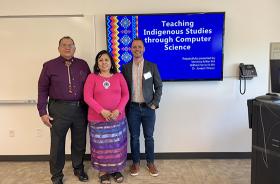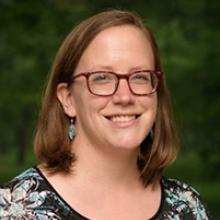CS@AIR: Computer Science for Educators and Students

At CS@AIR, we believe that computer science is both an academic discipline and a fundamental literacy in the 21st century. Our portfolio of projects illustrates how we build, use, and leverage evidence to ensure that every student gets access to inclusive and high-quality CS education.
Explore our work in the following areas:
- Researcher-Practitioner Partnerships
- Evaluation Services
- Micro-credentials and Educator Professional Learning
- Alliances and Communities of Practice

Researcher-Practitioner Partnerships
Staff across AIR are experienced in facilitating Researcher-Practitioner Partnerships (RPPs). RPPs are emerging approaches in which researchers and practitioners (such as teachers, counselors, or school administrators) work as equal partners to address complex and persistent problems of practice in the field; RPPs in particular have become very popular because of the National Science Foundation’s CSforAll: Research and RPPs program. While AIR leads several CS-related RPPs, we can also serve as evaluators of RPPs.
Project Spotlight

Wind River Elementary Computer Science Collaborative
AIR partners with three school districts on the Wind River Reservation, the Wyoming Department of Education, and BootUp Professional Development in this RPP. The focus of the project is on creating culturally relevant computer science education opportunities for Indigenous students – specifically, the Eastern Shoshone and Northern Arapaho students on the Wind River Reservation.
Evaluation Services
CS@AIR has a diverse portfolio of evaluation work in the CS education space. Our projects span from designing and implementing randomized control trials as part of research funded by the U.S. Department of Education to helping state governments determine the effectiveness of funding for CS education.
Project Spotlight

Exploring Computer Science Fellows 2.0
In partnership with Teach For America (TFA) and the University of Oregon, AIR is implementing a multi-year project focused on understanding how to recruit teachers of color, supporting them in navigating obstacles to broadening participation and advocating for computer science instruction in their schools, and helping them create equitable computer science learning environments.
Micro-credentials & Educator Professional Learning
Micro-credentials are a rapidly expanding element of modern teacher professional learning and are increasingly being explored by school districts and states as an alternative pathway for computer science teacher licensure. CS@AIR has been an early leader in helping conceptualize and implement micro-credential and educator professional learning programs.
Project Spotlight

Wyoming Computer Science Micro-Credential Courses for Elementary Teachers
The Wyoming Department of Education recently created a set of computer science micro-credentials for elementary teachers. AIR developed, piloted, and implemented a series of self-paced courses in the Canvas platform that apply principles of adult learning to support teachers in meeting the micro-credential requirements. The courses are designed to provide multiple resources to support teachers’ ongoing computer science learning and teaching.
Alliances and Communities of Practice
Because computer science is a new, exciting, and frequently evolving subject in schools, there is a growing recognition that not a single person or entity has all the answers, resources, or solutions. Alliances and communities of practice are models of collaboration that have become popular in many CS education circles.
Project Spotlight

Computer Science (CS) for All Teachers
CS for All Teachers is a virtual community of practice, welcoming all teachers from PreK through high school who are interested in teaching computer science. It provides an online home for teachers to connect with one another and with the resources and expertise they need to successfully teach computer science in their classrooms.


